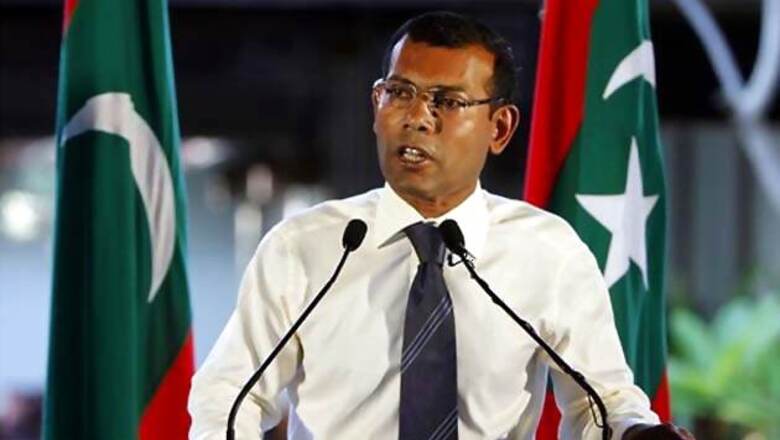
views
Male: Maldives ex-president Mohamed Nasheed awaited arrest in his house on Thursday, vowing to stay and fight against the government he says ousted him in a coup with the connivance of the police and the military.
But, as rain fell on Male, capital of the Indian Oceans islands renowned for their luxury resorts, and supporters stood outside Nasheed's family home, there was no sign of a move against him by the government or police.
Police Commissioner Abdullah Riyaz, asked by Reuters if and when Nasheed would be arrested, declined to comment, and the government said nothing on the subject.
Nasheed, the islands' first democratically elected president, appeared to dare the government led by his former vice president, Mohamed Waheed Hussain Manik, to arrest him after violent protests on Wednesday spread outside Male.
"The home minister has pledged (I will be) the first former president to spend all my life in jail," said Nasheed, who was relaxed and smiling and showed no signs of his reported beating on Wednesday.
He said he hoped the international community would act quickly as "the facts on the ground are that tomorrow I will be in jail".
Nasheed said he would accept his arrest, as he had done 27 times before when former President Maumoon Abdul Gayoom was in power. Nasheed narrowly beat Gayoom in a 2008 election, defeating the man who had jailed him for six years in all.
On Wednesday, Nasheed declared that his resignation the day before was in fact a gunpoint coup engineered by a coterie of police, military and political rivals, and led thousands of supporters onto the streets where they clashed with riot police and troops.
Only about 330,000 people live permanently in the Maldives but there has been much interest in the tumult because of the huge number of holidaymakers who visit the islands.
The Maldives gets about one million visitors a year, most seeking a beach or scuba diving holiday getaway at resorts that charge up to $1,000 per night.
VIOLENCE SPREADS
Earlier on Thursday, police commissioner Riyaz told reporters that 18 police stations and two courts on other atolls including the second-largest population centre, Addu, had been burned or attacked by Nasheed supporters the day before.
Nasheed called the violence spontaneous.
Newly sworn in Interior Minister Mohamed Jameel, at a news conference on Thursday, accused Nasheed and his supporters of terrorism, echoing a police statement the night before.
"They said they are going to throw out the current constitutionally formed government, and following that, we saw this destruction," Jameel said. "I would define it as the worst day in the history of the Maldives."
Jameel was the author of a pamphlet, criticising Nasheed's religious policy as un-Islamic, which included anti-Semitic language, part of a spate of increasingly hardline Islamist rhetoric that has entered the Maldives political discourse.
Western diplomats are in Male, along with a Commonwealth team that met Nasheed and other leaders on Thursday. UN Assistant Secretary General for Political Affairs Oscar Fernandez-Taranco also arrived for a three-day visit.
"It should be made clear that any solution to this crisis must be generated by national actors. There can be no externally generated solution to something that can be solved by Maldivians themselves," Fernandez-Taranco told reporters.
The unrest has taken place far from areas frequented by tourists, who usually land at an airport on an island near Male and go directly to the various resorts in the 1,200-island archipelago by speed boat or seaplane.
Protests against Nasheed's government started after he ordered the military to arrest the criminal court chief justice, saying he was blocking multi-million dollar corruption and human rights cases against allies of Gayoom who, in power for 30 years, was Asia's longest-serving ruler until Nasheed beat him.
Western diplomats said they wanted all political parties, including Nasheed's, to back down and join the unity government, while investigations into the events surrounding the constitutional crisis and Nasheed's exit were carried out.
"We want to take the politics off the streets and cool the rhetoric down," a European diplomat based in Colombo told Reuters.


















Comments
0 comment